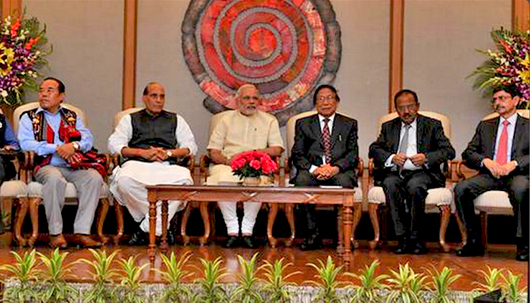New Delhi, Aug 4: In a bid to end insurgency in the northeastern state of Nagaland, the Government of India on Monday inked a historic peace accord with Naga militant group NSCN(IM).
The landmark peace treaty was signed in the presence of Prime Minister Narendra Modi at his official 7, Race Course Road residence.
Home Minister Rajnath Singh, National Security Advisor Ajit Doval and government's interlocutor RN Ravi were also among those present on the occasion.
Thuingaleng Muivah signed the peace
accord with the Indian government on behalf of the Nationalist Socialist Council of Nagaland (Isaac-Muivah).
The signing of the peace pact is the culmination of over 80 rounds of negotiations that spanned 16 years with first breakthrough in 1997 when ceasefire agreement was sealed.
While the NSCN(IM) is the biggest Naga rebel group which has been maintaining the ceasefire, another faction led by SS Khaplang continues to indulge in violence and was believed to be behind the deadly attack on Army convoy in Manipur in June that left 18 soldiers dead and 18 injured.
It was not immediately clear whether the agreement meets the main demand of NSCN(IM) for integration of all Naga-inhabited areas in the Northeast across Manipur, Arunachal Pradesh and Assam.
Details and execution plan within this framework agreement will be released soon, official sources said.
“I thank god for this momentous occasion,” T Muivah said after signing the peace agreement.
“Under the leadership of PM Narendra Modi, we have come close to understanding each other and worked out a new relationship between the two parties,” the NSCN(IM) leader said further, and added, “let me assure you that Nagas can be trustworthy”.
T Muivah, general secretary of the NSCN(IM), was one of the key leaders who had spearheaded the rebel movement in Nagaland.
Speaking after the signing of the accord, PM Modi said that the Naga political issue, which lingered for six decades, took a huge toll on generations of Naga people.
Thanking T Muivah for his cooperation in signing the “historic” accord, the PM said, “I have the deepest admiration for the great Naga people for their extraordinary support to the peace efforts.”
“I sincerely thank Shri Isaac Swu, Shri Muivah and other Naga leaders for their wisdom and courage,” he added.
Modi rued that it took so long for the peace deal to be reached.
“Unfortunately, the Naga problem has taken so long to resolve, because we did not understand each other. It's a legacy of the British rule,” the PM said.
He said there were not many like Mahatma Gandhi, "who loved the Naga people and were sensitive to their sentiments. We have continued to look at each other through the prism of false perceptions and old prejudices."
“Today we mark not merely the end of a problem but the beginning of a new future. Today, to the people of Nagaland I want to say that your talents, tradition and efforts will make the nation stronger,” the PM added.
He said further, "We will not only try to heal wounds and resolve problems, but also be your partner as you restore your pride and prestige."
"Today's agreement is a shining example of what we can achieve when we deal with each other in a spirit of equality and respect, trust and confidence; when we seek to understand concerns and try to address aspirations; when we leave the path of dispute and take the high road of dialogue. It is a lesson and an inspiration in our troubled world," the Prime Minister said.
Stating that violence has never solved any problem, PM Modi said, “Since becoming Prime Minister last year, peace, security and economic transformation of the Northeast has been amongst my highest priorities.”
Before the agreement was signed in the evening, Modi spoke to leaders of various parties including former PM Manmohan Singh, Congress' Mallikarjun Kharge, SP chief Mulayam Singh Yadav, BSP's Mayawati, NCP supremo Sharad Pawar and CPI(M) general secretary Sitaram Yechury.
He also spoke to West Bengal Chief Minister Mamata Banerjee, her Tamil Nadu counterpart J Jayalalithaa besides the Nagaland Governor Padmanabha Acharya and Chief Minister TR Zeliang. He also called up DMK leader M Karunanidhi and JD(S) leader HD Deve Gowda.






Comments
Add new comment